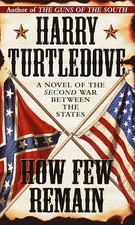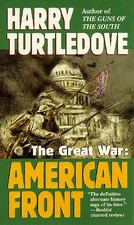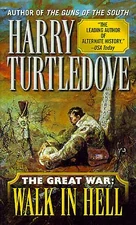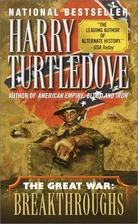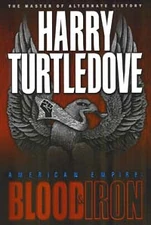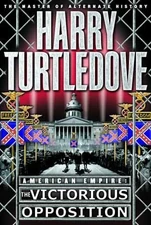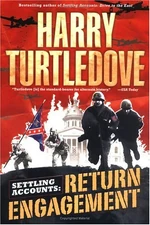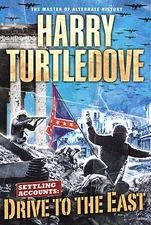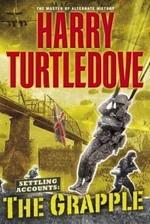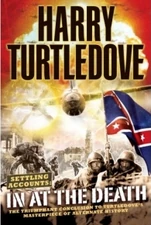ML4E (Message Wall | contribs) m (→''1916'') Tag: Source edit |
TR (Message Wall | contribs) Tag: Source edit |
||
| Line 131: | Line 131: | ||
* '''Spring''': |
* '''Spring''': |
||
* ''March'': On the European Front, a [[Russian Revolution (Southern Victory)|Russian Uprising]] in [[Petrograd]] leads to a full blown Revolution. |
* ''March'': On the European Front, a [[Russian Revolution (Southern Victory)|Russian Uprising]] in [[Petrograd]] leads to a full blown Revolution. |
||
| − | * ''15th April'': La République de Québec is established and garners recognition from the United States, the German Empire, Austria-Hungary, the Ottoman Empire, Chile, the Kingdom of Bulgaria, the |
+ | * ''15th April'': La République de Québec is established and garners recognition from the United States, the German Empire, Austria-Hungary, the Ottoman Empire, Chile, the Kingdom of Bulgaria, the government of the [[Liberia (Southern Victory)|Republic of Liberia]] and the government-in-exile of the Republic of Haiti in Philadelphia. |
* ''23rd April'': Union troops breakthrough into Nashville with the new strategy of deploying [[Barrel|''Barrels'']] in a concentrated strike, a [[Barrel Roll Offensive|''Barrel Roll Offensive'']]. |
* ''23rd April'': Union troops breakthrough into Nashville with the new strategy of deploying [[Barrel|''Barrels'']] in a concentrated strike, a [[Barrel Roll Offensive|''Barrel Roll Offensive'']]. |
||
| − | * ''May'': |
+ | * ''May'': [[Edward C.L. Wiggins]] secretly approaches Socialist Congresswoman [[Flora Hamburger]] about a possible peace deal. Hamburger presents the offer to President Roosevelt, who, determined to teach the C.S.A. a lesson, dismisses the proposal. |
* '''Late Spring''': |
* '''Late Spring''': |
||
| − | * |
+ | * U.S. forces finally take down the Canadian city of [[Winnipeg (Southern Victory)|Winnipeg]]. |
* The Western part of Confederate State of Texas is seized by the Union and is designated the [[Houston (State)|United State of Houston]] named after [[Sam Houston (Southern Victory)|Sam Houston]]. |
* The Western part of Confederate State of Texas is seized by the Union and is designated the [[Houston (State)|United State of Houston]] named after [[Sam Houston (Southern Victory)|Sam Houston]]. |
||
* '''Summer''': |
* '''Summer''': |
||
* The [[Brazil (Southern Victory)|Empire of Brazil]] enters the war on the side of the Central Powers, closing off ports to the United Kingdom and opening them to the United States. |
* The [[Brazil (Southern Victory)|Empire of Brazil]] enters the war on the side of the Central Powers, closing off ports to the United Kingdom and opening them to the United States. |
||
| − | * With a growing ant-war sentiment among the populace and numerous [[French Army Mutinies (Southern Victory)|military mutinies]], the Republic of France asks Germany for an |
+ | * With a growing ant-war sentiment among the populace and numerous [[French Army Mutinies (Southern Victory)|military mutinies]], the Republic of France asks Germany for an armistice. |
| − | * ''July'': The C.S.A. requests a ceasefire on the Tennessee |
+ | * ''July'': The C.S.A. requests a ceasefire on the Tennessee Front. |
| − | * Quebec City is taken by the |
+ | * Quebec City is taken by the U.S. forces and becomes a part of La République de Québec. |
| − | * ''August'': After |
+ | * ''August'': After U.S. infantry make a final push into the Rappahannock County, the CSA officially asks for an armistice on all fronts. |
* '''Fall''': |
* '''Fall''': |
||
| − | * ''September'': The Dominion of Canada asks the |
+ | * ''September'': The Dominion of Canada asks the USA for an armistice. |
===Interwar Period=== |
===Interwar Period=== |
||
Revision as of 23:45, 27 May 2022
Southern Victory (also called Timeline-191 after General Robert E. Lee's special order #191) is a series of 11 books by Harry Turtledove, with an alternate history starting in 1862 during the American Civil War, where the South (CSA) wins the War of Secession after allying itself with Great Britain and France, and ending in 1945 following a war similar to World War II.
Volumes
- How Few Remain
- American Front
- Walk in Hell
- Breakthroughs
- Blood and Iron
- The Center Cannot Hold
- The Victorious Opposition
- Return Engagement
- Drive to the East
- The Grapple
- In at the Death
Series
- In How Few Remain (1862 and 1881 to 1882) (1 book), in 1862, the Confederates States defeated the United States at the Battle of Camp Hill before going on to capture Philadelphia during the War of Secession gaining the recognition of Britain and France in the process. In 1881, the Confederacy defeat the USA again in a war instigated by the CSA's purchase of the states of Chihuahua and Sonora from Mexico.
- In The Great War (1914 to 1917) (3 books), the USA fights along side Germany, Austria-Hungary, and the Ottoman Empire against the Quadruple Entente, which consists of the CSA, Great Britain, France, and Russia.
- American Empire (1918 to 1941) (3 books) deals with the aftermath of the Great War, where the CSA faces limitations not unlike those placed on Germany after the Treaty of Versailles. It sees the creation of the Freedom Party, and the rise of Jake Featherston to power.
- Settling Accounts (1941 to 1945) (4 books) deals with the events of the Second Great War.
Timeline
The War of Secession
- series: How Few Remain
- POD: 1862: Special Order-191 is recovered by a Confederate soldier. The Army of the Potomac is later crushed at the Battle of Camp Hill in Pennsylvania enabling the Confederacy to capture Philadelphia coupled with the successful invasion of Kentucky by Braxton Bragg wins them diplomatic recognition from Great Britain and France. The United States are forced to grant the Confederate States their independence.
The Uneasy Peace
- series: How Few Remain
- 1863: The Dominion of Canada is created.
- 1864: Abraham Lincoln (then Republican) loses the presidential election in a landslide to a Democratic candidate.
- late 1860s: Russia attempts to sell Alaska to the United States. However, a $7 million price tag is too much money.
- 1871: Germany unified into a single sovereign state after the Franco-Prussian War which ended in a Prussian/German victory.
- 1876: Samuel Tilden (Democrat) is elected President of the USA.
- 1879: James Longstreet (Whig and war hero of the War of Secession) is elected President of the Confederate States.
- 1880: James G. Blaine (Republican), known for his hardline anti-Confederate policies, defeats Samuel Tilden in the 1880 election.
The Second Mexican War
- series: How Few Remain
- 1881-1882 : The CSA finalize the purchase Sonora and Chihuahua from the Mexican Empire for $3,000,000. The USA use the purchase as a pretext for declaring war upon the Confederacy. James Longstreet enters the CSA into an alliance with Britain and France. This results in a victory for the Confederacy once more. Part of northern Maine is annexed into the Canadian providence of New Brunswick. The only major victory for the U.S in the war was in Montana, where forces under Theodore Roosevelt and George Armstrong Custer were able to repel the British and Canadian invaders, albeit after the official end of the war. The USA creates an alliance with the German Empire. As part of its negotiations with France and Britain, the Confederacy phases out slavery, although heavy segregation remains. The day of the Armistice (April 22) becomes Remembrance Day in the USA. It is treated as a somber commemoration holiday.
- In the aftermath of the war, the Republican party suffers a three way split, with the left-wing Socialist Party forming under leadership of former President Abraham Lincoln, his followers, and liberal Republicans. The Democrats are pushed to the right by conservative Republicans merging into the party with the help of Benjamin Butler and become an ongoing majority party. The Republicans survive, but as a centralist third party with very little power outside the Midwestern US.
- The Confederate States keep their new Mexican states and makes plans to build railway from Texas to the Gulf of California / Pacific Ocean.
- The United States accepts overtures from the German Empire to establish an alliance. This eventually leads to the creation of the Quadruple Alliance.
Before the Great War
- series: none
- 1882: Former President Abraham Lincoln splits Republican Party, forming a new Socialist Party.
- CSA builds railway connecting Texas with port city of Guaymas, Sonora, on the Pacific coast.
- 1884: President Blaine loses the 1884 Presidential Election to the Democratic candidate in a landslide.
- c. 1894: The CSA attempts to build a canal crossing through Central America (specifically Nicaragua), but this plan is shelved after US President Alfred Thayer Mahan threatens war. Panama remains a part of Colombia.
- 1896: Thomas Reed {Democrat} is elected president of the United States.
- 1901: The Hispano-Japanese War. Japan defeats Spain in a war, and as a result, the nation holds on to Joseon (Korea) and Formosa (Taiwan). The Japanese Empire also seizes Guam and the Philippines from Spain after the War.
- 1903: Russia joins Britain, France, and the Confederacy to form the alliance known as the Quadruple Entente.
- 1909: Woodrow Wilson is elected president of the Confederacy.
- 1912: Democratic candidate Theodore Roosevelt is elected President of the United States over Socialist candidate Eugene V. Debs.
The Great War
- series: The Great War
1914
- Summer:
- 28th June: Assassination of Archduke Franz Ferdinand in Sarajevo. Pro-Serbian terrorists hit Franz Ferdinand’s car with a bomb.
- Late July: Mobilization of the USA and Germany.
- August: The Austro-Hungarian Empire accuses Serbia of backing the assassination; this leads to war between the two. The Alliance system means that Russia, France and Britain side with Serbia and Germany with Austro-Hungary. The United States declare war on the Confederate States and Canada (Britain), and launch an invasion of both countries.
- Fall:
- In the CSA, Kentucky and western Virginia are attacked.
- The Confederates launch a counter-invasion through Maryland and Pennsylvania, and succeed in occupying Washington, DC.
- In the Pacific Ocean, the USA captures the Sandwich Islands (Hawaii) from Great Britain.
- As presaged by the attempted invasion of Kentucky by the USA in 1882, trench warfare soon develops on most fronts in North America. The series concentrates on the deadlock on the Maryland / Pennsylvania border, the Kentucky front, the Roanoke Valley front, and skirmishes in Sequoyah (Oklahoma).
- Winter:
- 25th December: The armies on the North American continent are slowed down by the cold. In both Europe and North America Christmas truces bring the fighting to a tantalizingly temporary halt.
1915
- Winter:
- Confederate cavalry raids into Kansas sought to destroy railroad lines and telegraph cables; though some of these raids succeeded, Confederate horsemen suffered heavier than expected losses battling armored cars that carried machine guns.
- Early Spring:
- 4th April Easter: The Mormon population in Utah attempts to secede from the USA in Rebellion. US Army troops are sent to quash the rebellion.
- 22nd April: On Remembrance Day a riot breaks out in New York. It is unknown whether the this was started by Fanatic-Socialist or Mormon-Sympathizers, However the majority of rioting was perpetuated by the Socialists therefore they were given most of the blame.
- 7th May: Union forces on the Roanoke Front begin using poison gas however this merely causes increased misery for infantrymen.
- Fall:
- Red Rebellion of the black population of the Confederacy. Communist cells pop up throughout the South, particularly in areas with a high black population.
- Gabriel Semmes is easily elected President of the Confederate States over Radical Liberal Party candidate Doroteo Arango in the 1915 Presidential Election.
The war remains stalemated, with USA forces unable to break through to Guaymas, Nashville, Washington, DC, Winnipeg, Montreal, or Quebec City.
1916
- Winter:
- Stalemate remained the rule on all fronts. The only progress took place in the West, where the Mormons were crushed and US forces made progress in Texas and Sequoyah.
- Red Revolutionaries in South Carolina establish the Congaree Socialist Republic. The Confederacy is forced to divert military resources to take on the Red forces rampaging throughout many parts of the South.
- The Battle of the Three Navies breaks out in the Pacific Ocean to the South and West of the Sandwich Islands. The U.S. Pacific fleet engaged with the British Royal Navy and the Navy of Imperial Japan.
- Spring:
- The Congaree Socialist Republic is scattered by Confederate forces, the remaining Reds flee into the swamps and continue a resistance of guerilla warfare.
- 7th April: On the European Front, the City of Verdun falls to German Forces after six weeks of intense battle. This German victory at the Battle of Verdun is felt across the world and signals to many on both sides of that the probability of France’s ultimate defeat in the Great War.
- Summer:
- August: A new USA invention, the Barrel (OTL Tank), is able to grant Union forces an advantage but did not live up to expectations due to poor tactical deployment.
- Fall:
- September: CS President Gabriel Semmes introduces a Bill to conscript and arm Black Troops.
- November: US President Theodore Roosevelt is easily re-elected over Socialist candidate Eugene V. Debs.
1917
- Spring:
- March: On the European Front, a Russian Uprising in Petrograd leads to a full blown Revolution.
- 15th April: La République de Québec is established and garners recognition from the United States, the German Empire, Austria-Hungary, the Ottoman Empire, Chile, the Kingdom of Bulgaria, the government of the Republic of Liberia and the government-in-exile of the Republic of Haiti in Philadelphia.
- 23rd April: Union troops breakthrough into Nashville with the new strategy of deploying Barrels in a concentrated strike, a Barrel Roll Offensive.
- May: Edward C.L. Wiggins secretly approaches Socialist Congresswoman Flora Hamburger about a possible peace deal. Hamburger presents the offer to President Roosevelt, who, determined to teach the C.S.A. a lesson, dismisses the proposal.
- Late Spring:
- U.S. forces finally take down the Canadian city of Winnipeg.
- The Western part of Confederate State of Texas is seized by the Union and is designated the United State of Houston named after Sam Houston.
- Summer:
- The Empire of Brazil enters the war on the side of the Central Powers, closing off ports to the United Kingdom and opening them to the United States.
- With a growing ant-war sentiment among the populace and numerous military mutinies, the Republic of France asks Germany for an armistice.
- July: The C.S.A. requests a ceasefire on the Tennessee Front.
- Quebec City is taken by the U.S. forces and becomes a part of La République de Québec.
- August: After U.S. infantry make a final push into the Rappahannock County, the CSA officially asks for an armistice on all fronts.
- Fall:
- September: The Dominion of Canada asks the USA for an armistice.
Interwar Period
- series: American Empire
Just as in our own time-line, the initial euphoria after the Great War soon collapses into a Great Depression. Among the former members of the defeated Quadruple Entente, the Confederacy and Great Britain develop nascent reactionary, authoritarian movements and France re-installs the monarchy under King Charles XI. In the Confederate States, the newly formed Freedom Party exploits racial animosity and the memory of the Red Negro uprisings of 1915-16. This gains the attention of the very bitter Jake Featherston. The Confederacy begins to rearm.
Second Great War
- series: Settling Accounts
Turtledove's influences
Turtledove has specifically acknowledged MacKinlay Kantor's If the South Had Won the Civil War (1960) as the source of some ideas incorporated into Southern Victory. Similarities between the two works include abolition of Southern slavery occurring in the 1880s under President James Longstreet, Theodore Roosevelt and Woodrow Wilson being simultaneous Presidents of the USA and CSA respectively, Cuba annexed and incorporated into the Confederacy, Alaska not purchased and remaining part of Russia, and Texas becoming an independent Republic for the second time.
See also
- The Guns of the South, where the Confederate States become an independent nation after winning the Second American Revolution in 1864.
- "Must and Shall," where the Union defeats the Confederacy's Great Rebellion in the 1860s, imposes a harsher reconstruction, and so still has to occupy the defeated region in the 1940s.
- Gunpowder Empire, the first volume of the Crosstime Traffic Series. In one scene, characters watch footage from an alternate where the Confederate States won the American Civil War and remained a nation throughout the 21st century. This alternate is never described further.
